Nursing Assessment: Mental Health Examination and Care Plan for Mrs. B
VerifiedAdded on 2023/01/06
|6
|1893
|58
Homework Assignment
AI Summary
This assignment presents a detailed mental health examination of an 85-year-old woman, Mrs. B, focusing on her general appearance, behavior, level of consciousness, speech, emotional state, and thought processes. The analysis identifies acute confusion, paranoid thoughts, and cognitive impairment, suggesting potential dementia or other mental health issues. The assignment further explores additional assessment information needed, such as sleeping patterns and daily routines, and discusses diagnostic formulation, considering Mrs. B's medical history of conditions like hypothyroidism and cardiovascular disease. It also outlines the main goals of a care plan, emphasizing the need for medication, a structured routine, and monitoring, as well as the importance of collaboration with Mrs. B and her family to optimize her care. The assignment concludes with a list of references to support the findings and recommendations.
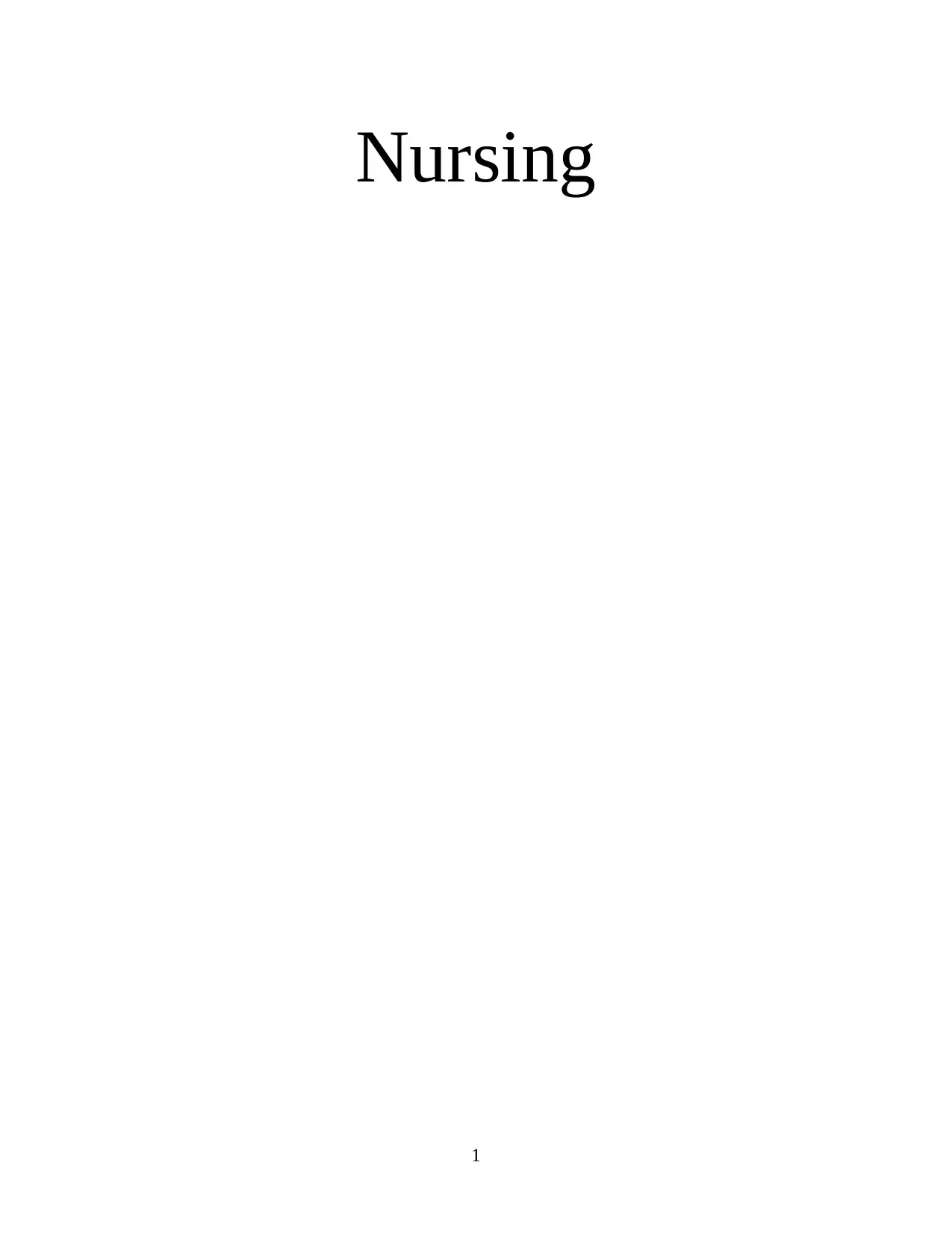
Nursing
1
1
Paraphrase This Document
Need a fresh take? Get an instant paraphrase of this document with our AI Paraphraser
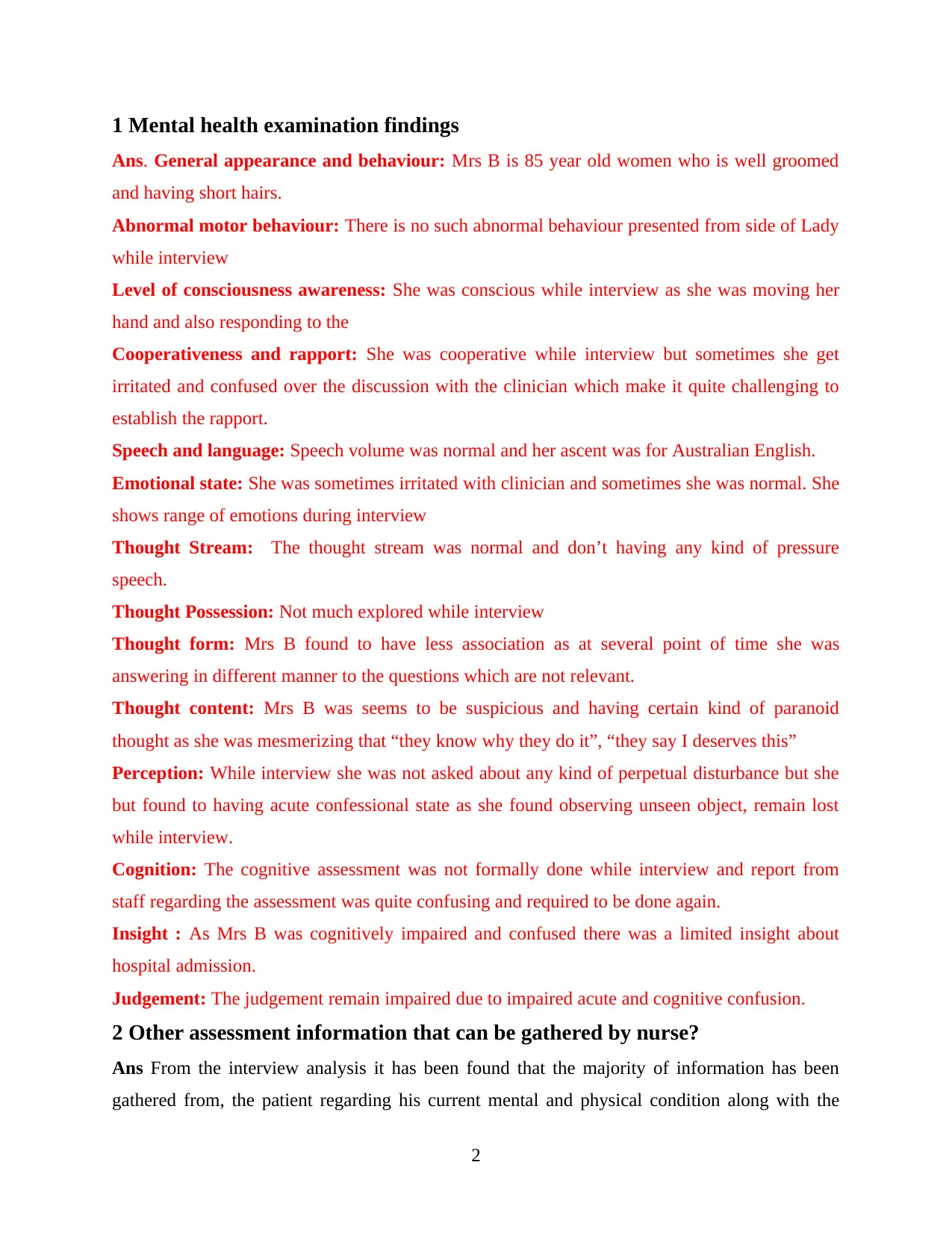
1 Mental health examination findings
Ans. General appearance and behaviour: Mrs B is 85 year old women who is well groomed
and having short hairs.
Abnormal motor behaviour: There is no such abnormal behaviour presented from side of Lady
while interview
Level of consciousness awareness: She was conscious while interview as she was moving her
hand and also responding to the
Cooperativeness and rapport: She was cooperative while interview but sometimes she get
irritated and confused over the discussion with the clinician which make it quite challenging to
establish the rapport.
Speech and language: Speech volume was normal and her ascent was for Australian English.
Emotional state: She was sometimes irritated with clinician and sometimes she was normal. She
shows range of emotions during interview
Thought Stream: The thought stream was normal and don’t having any kind of pressure
speech.
Thought Possession: Not much explored while interview
Thought form: Mrs B found to have less association as at several point of time she was
answering in different manner to the questions which are not relevant.
Thought content: Mrs B was seems to be suspicious and having certain kind of paranoid
thought as she was mesmerizing that “they know why they do it”, “they say I deserves this”
Perception: While interview she was not asked about any kind of perpetual disturbance but she
but found to having acute confessional state as she found observing unseen object, remain lost
while interview.
Cognition: The cognitive assessment was not formally done while interview and report from
staff regarding the assessment was quite confusing and required to be done again.
Insight : As Mrs B was cognitively impaired and confused there was a limited insight about
hospital admission.
Judgement: The judgement remain impaired due to impaired acute and cognitive confusion.
2 Other assessment information that can be gathered by nurse?
Ans From the interview analysis it has been found that the majority of information has been
gathered from, the patient regarding his current mental and physical condition along with the
2
Ans. General appearance and behaviour: Mrs B is 85 year old women who is well groomed
and having short hairs.
Abnormal motor behaviour: There is no such abnormal behaviour presented from side of Lady
while interview
Level of consciousness awareness: She was conscious while interview as she was moving her
hand and also responding to the
Cooperativeness and rapport: She was cooperative while interview but sometimes she get
irritated and confused over the discussion with the clinician which make it quite challenging to
establish the rapport.
Speech and language: Speech volume was normal and her ascent was for Australian English.
Emotional state: She was sometimes irritated with clinician and sometimes she was normal. She
shows range of emotions during interview
Thought Stream: The thought stream was normal and don’t having any kind of pressure
speech.
Thought Possession: Not much explored while interview
Thought form: Mrs B found to have less association as at several point of time she was
answering in different manner to the questions which are not relevant.
Thought content: Mrs B was seems to be suspicious and having certain kind of paranoid
thought as she was mesmerizing that “they know why they do it”, “they say I deserves this”
Perception: While interview she was not asked about any kind of perpetual disturbance but she
but found to having acute confessional state as she found observing unseen object, remain lost
while interview.
Cognition: The cognitive assessment was not formally done while interview and report from
staff regarding the assessment was quite confusing and required to be done again.
Insight : As Mrs B was cognitively impaired and confused there was a limited insight about
hospital admission.
Judgement: The judgement remain impaired due to impaired acute and cognitive confusion.
2 Other assessment information that can be gathered by nurse?
Ans From the interview analysis it has been found that the majority of information has been
gathered from, the patient regarding his current mental and physical condition along with the
2
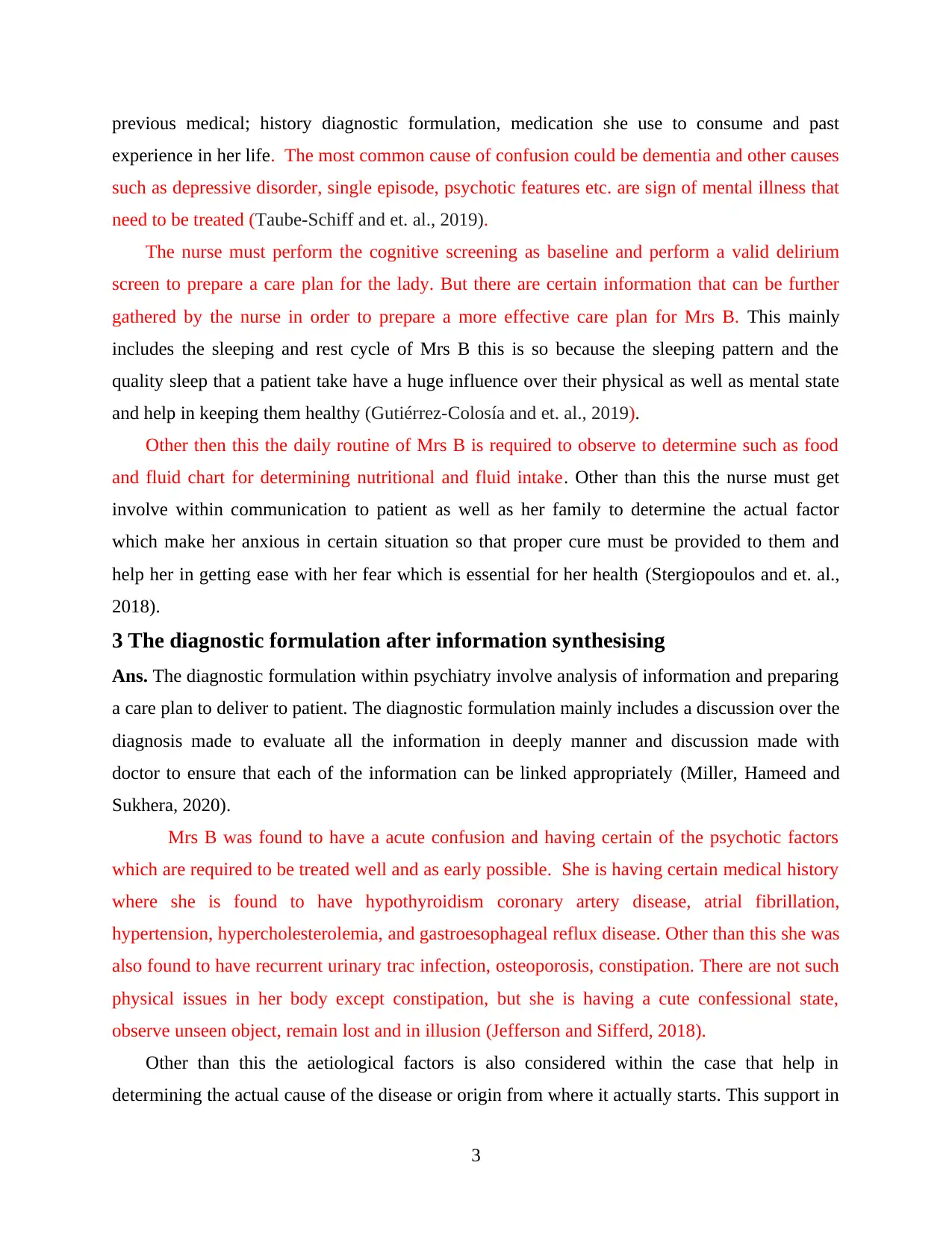
previous medical; history diagnostic formulation, medication she use to consume and past
experience in her life. The most common cause of confusion could be dementia and other causes
such as depressive disorder, single episode, psychotic features etc. are sign of mental illness that
need to be treated (Taube-Schiff and et. al., 2019).
The nurse must perform the cognitive screening as baseline and perform a valid delirium
screen to prepare a care plan for the lady. But there are certain information that can be further
gathered by the nurse in order to prepare a more effective care plan for Mrs B. This mainly
includes the sleeping and rest cycle of Mrs B this is so because the sleeping pattern and the
quality sleep that a patient take have a huge influence over their physical as well as mental state
and help in keeping them healthy (Gutiérrez-Colosía and et. al., 2019).
Other then this the daily routine of Mrs B is required to observe to determine such as food
and fluid chart for determining nutritional and fluid intake. Other than this the nurse must get
involve within communication to patient as well as her family to determine the actual factor
which make her anxious in certain situation so that proper cure must be provided to them and
help her in getting ease with her fear which is essential for her health (Stergiopoulos and et. al.,
2018).
3 The diagnostic formulation after information synthesising
Ans. The diagnostic formulation within psychiatry involve analysis of information and preparing
a care plan to deliver to patient. The diagnostic formulation mainly includes a discussion over the
diagnosis made to evaluate all the information in deeply manner and discussion made with
doctor to ensure that each of the information can be linked appropriately (Miller, Hameed and
Sukhera, 2020).
Mrs B was found to have a acute confusion and having certain of the psychotic factors
which are required to be treated well and as early possible. She is having certain medical history
where she is found to have hypothyroidism coronary artery disease, atrial fibrillation,
hypertension, hypercholesterolemia, and gastroesophageal reflux disease. Other than this she was
also found to have recurrent urinary trac infection, osteoporosis, constipation. There are not such
physical issues in her body except constipation, but she is having a cute confessional state,
observe unseen object, remain lost and in illusion (Jefferson and Sifferd, 2018).
Other than this the aetiological factors is also considered within the case that help in
determining the actual cause of the disease or origin from where it actually starts. This support in
3
experience in her life. The most common cause of confusion could be dementia and other causes
such as depressive disorder, single episode, psychotic features etc. are sign of mental illness that
need to be treated (Taube-Schiff and et. al., 2019).
The nurse must perform the cognitive screening as baseline and perform a valid delirium
screen to prepare a care plan for the lady. But there are certain information that can be further
gathered by the nurse in order to prepare a more effective care plan for Mrs B. This mainly
includes the sleeping and rest cycle of Mrs B this is so because the sleeping pattern and the
quality sleep that a patient take have a huge influence over their physical as well as mental state
and help in keeping them healthy (Gutiérrez-Colosía and et. al., 2019).
Other then this the daily routine of Mrs B is required to observe to determine such as food
and fluid chart for determining nutritional and fluid intake. Other than this the nurse must get
involve within communication to patient as well as her family to determine the actual factor
which make her anxious in certain situation so that proper cure must be provided to them and
help her in getting ease with her fear which is essential for her health (Stergiopoulos and et. al.,
2018).
3 The diagnostic formulation after information synthesising
Ans. The diagnostic formulation within psychiatry involve analysis of information and preparing
a care plan to deliver to patient. The diagnostic formulation mainly includes a discussion over the
diagnosis made to evaluate all the information in deeply manner and discussion made with
doctor to ensure that each of the information can be linked appropriately (Miller, Hameed and
Sukhera, 2020).
Mrs B was found to have a acute confusion and having certain of the psychotic factors
which are required to be treated well and as early possible. She is having certain medical history
where she is found to have hypothyroidism coronary artery disease, atrial fibrillation,
hypertension, hypercholesterolemia, and gastroesophageal reflux disease. Other than this she was
also found to have recurrent urinary trac infection, osteoporosis, constipation. There are not such
physical issues in her body except constipation, but she is having a cute confessional state,
observe unseen object, remain lost and in illusion (Jefferson and Sifferd, 2018).
Other than this the aetiological factors is also considered within the case that help in
determining the actual cause of the disease or origin from where it actually starts. This support in
3
⊘ This is a preview!⊘
Do you want full access?
Subscribe today to unlock all pages.

Trusted by 1+ million students worldwide
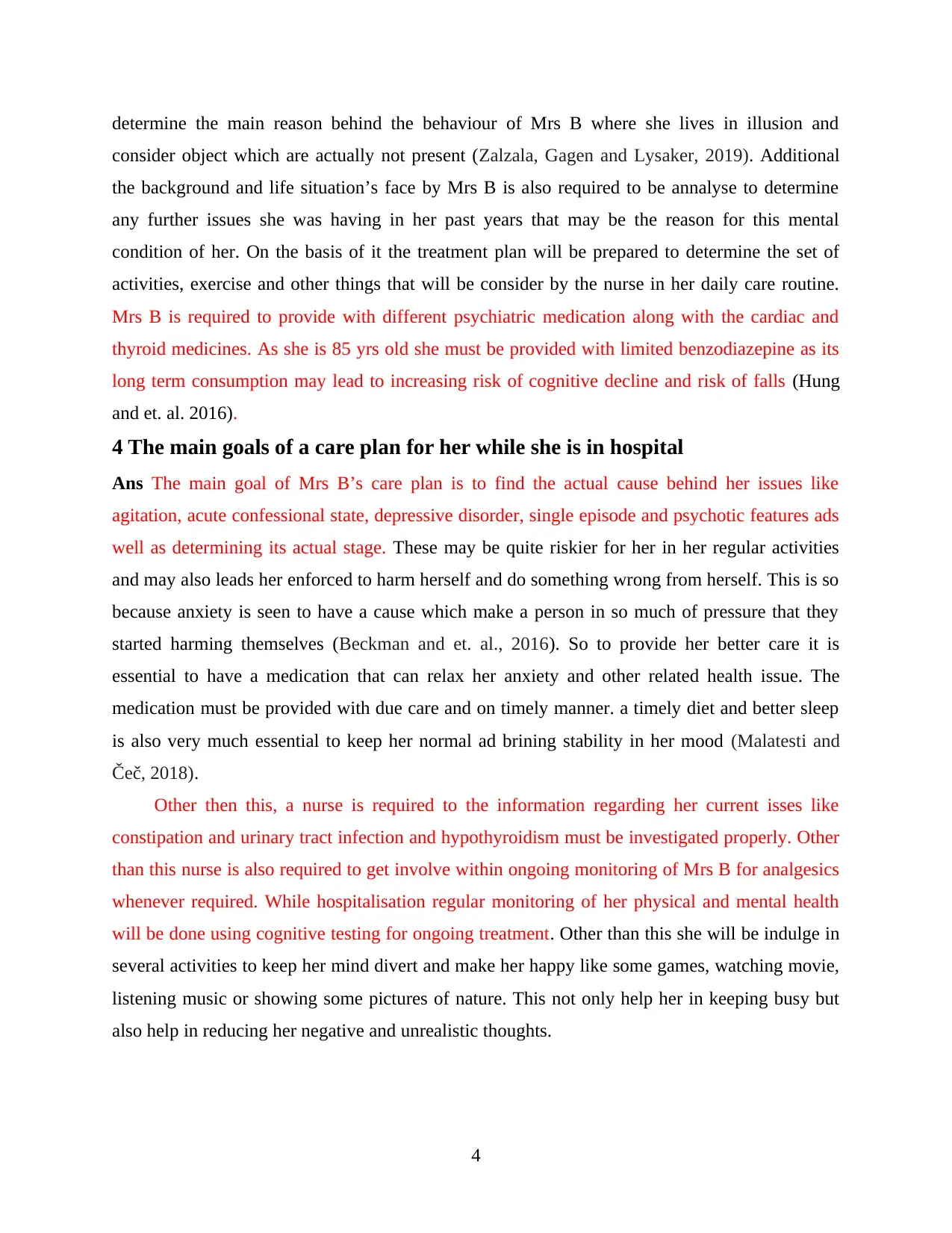
determine the main reason behind the behaviour of Mrs B where she lives in illusion and
consider object which are actually not present (Zalzala, Gagen and Lysaker, 2019). Additional
the background and life situation’s face by Mrs B is also required to be annalyse to determine
any further issues she was having in her past years that may be the reason for this mental
condition of her. On the basis of it the treatment plan will be prepared to determine the set of
activities, exercise and other things that will be consider by the nurse in her daily care routine.
Mrs B is required to provide with different psychiatric medication along with the cardiac and
thyroid medicines. As she is 85 yrs old she must be provided with limited benzodiazepine as its
long term consumption may lead to increasing risk of cognitive decline and risk of falls (Hung
and et. al. 2016).
4 The main goals of a care plan for her while she is in hospital
Ans The main goal of Mrs B’s care plan is to find the actual cause behind her issues like
agitation, acute confessional state, depressive disorder, single episode and psychotic features ads
well as determining its actual stage. These may be quite riskier for her in her regular activities
and may also leads her enforced to harm herself and do something wrong from herself. This is so
because anxiety is seen to have a cause which make a person in so much of pressure that they
started harming themselves (Beckman and et. al., 2016). So to provide her better care it is
essential to have a medication that can relax her anxiety and other related health issue. The
medication must be provided with due care and on timely manner. a timely diet and better sleep
is also very much essential to keep her normal ad brining stability in her mood (Malatesti and
Čeč, 2018).
Other then this, a nurse is required to the information regarding her current isses like
constipation and urinary tract infection and hypothyroidism must be investigated properly. Other
than this nurse is also required to get involve within ongoing monitoring of Mrs B for analgesics
whenever required. While hospitalisation regular monitoring of her physical and mental health
will be done using cognitive testing for ongoing treatment. Other than this she will be indulge in
several activities to keep her mind divert and make her happy like some games, watching movie,
listening music or showing some pictures of nature. This not only help her in keeping busy but
also help in reducing her negative and unrealistic thoughts.
4
consider object which are actually not present (Zalzala, Gagen and Lysaker, 2019). Additional
the background and life situation’s face by Mrs B is also required to be annalyse to determine
any further issues she was having in her past years that may be the reason for this mental
condition of her. On the basis of it the treatment plan will be prepared to determine the set of
activities, exercise and other things that will be consider by the nurse in her daily care routine.
Mrs B is required to provide with different psychiatric medication along with the cardiac and
thyroid medicines. As she is 85 yrs old she must be provided with limited benzodiazepine as its
long term consumption may lead to increasing risk of cognitive decline and risk of falls (Hung
and et. al. 2016).
4 The main goals of a care plan for her while she is in hospital
Ans The main goal of Mrs B’s care plan is to find the actual cause behind her issues like
agitation, acute confessional state, depressive disorder, single episode and psychotic features ads
well as determining its actual stage. These may be quite riskier for her in her regular activities
and may also leads her enforced to harm herself and do something wrong from herself. This is so
because anxiety is seen to have a cause which make a person in so much of pressure that they
started harming themselves (Beckman and et. al., 2016). So to provide her better care it is
essential to have a medication that can relax her anxiety and other related health issue. The
medication must be provided with due care and on timely manner. a timely diet and better sleep
is also very much essential to keep her normal ad brining stability in her mood (Malatesti and
Čeč, 2018).
Other then this, a nurse is required to the information regarding her current isses like
constipation and urinary tract infection and hypothyroidism must be investigated properly. Other
than this nurse is also required to get involve within ongoing monitoring of Mrs B for analgesics
whenever required. While hospitalisation regular monitoring of her physical and mental health
will be done using cognitive testing for ongoing treatment. Other than this she will be indulge in
several activities to keep her mind divert and make her happy like some games, watching movie,
listening music or showing some pictures of nature. This not only help her in keeping busy but
also help in reducing her negative and unrealistic thoughts.
4
Paraphrase This Document
Need a fresh take? Get an instant paraphrase of this document with our AI Paraphraser
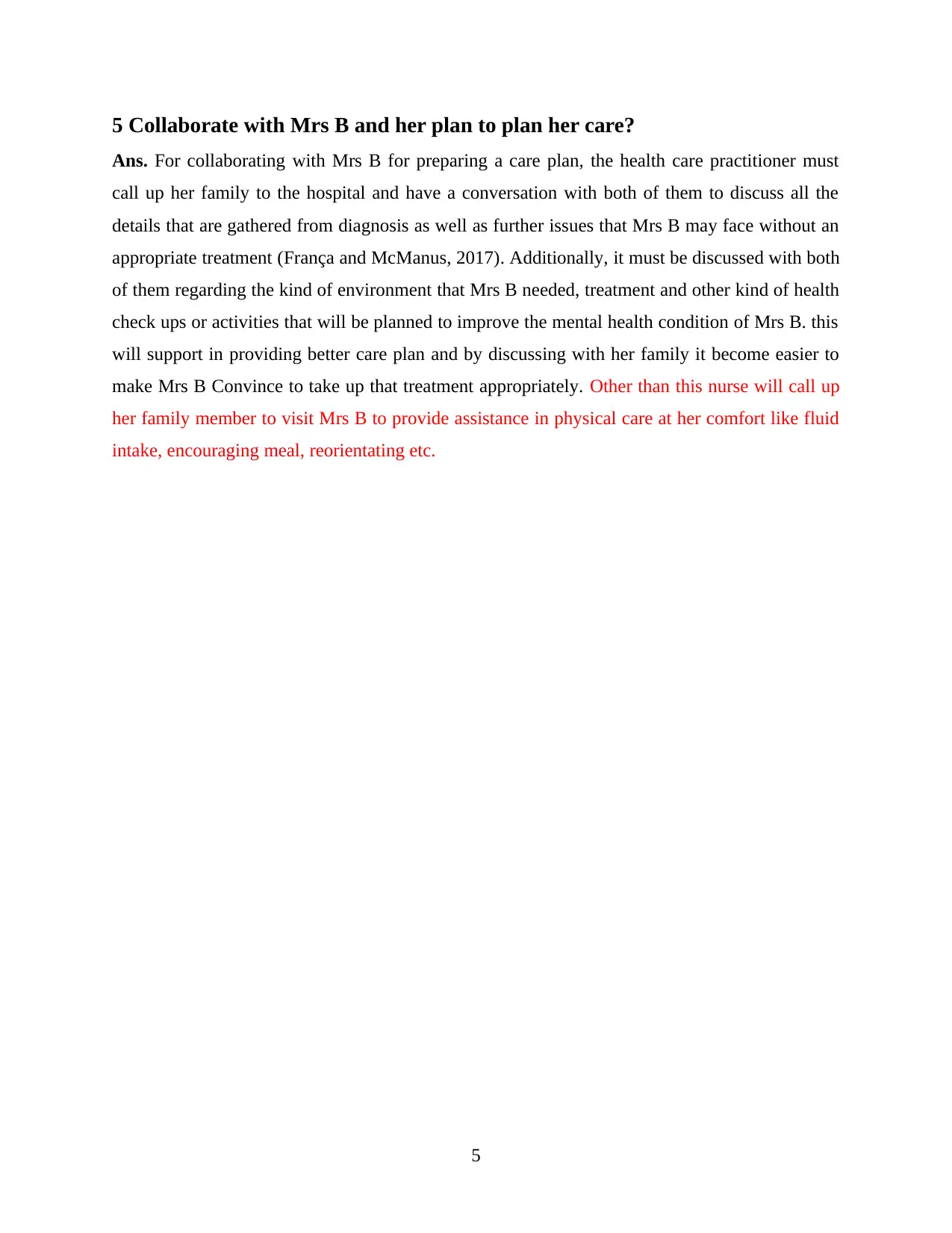
5 Collaborate with Mrs B and her plan to plan her care?
Ans. For collaborating with Mrs B for preparing a care plan, the health care practitioner must
call up her family to the hospital and have a conversation with both of them to discuss all the
details that are gathered from diagnosis as well as further issues that Mrs B may face without an
appropriate treatment (França and McManus, 2017). Additionally, it must be discussed with both
of them regarding the kind of environment that Mrs B needed, treatment and other kind of health
check ups or activities that will be planned to improve the mental health condition of Mrs B. this
will support in providing better care plan and by discussing with her family it become easier to
make Mrs B Convince to take up that treatment appropriately. Other than this nurse will call up
her family member to visit Mrs B to provide assistance in physical care at her comfort like fluid
intake, encouraging meal, reorientating etc.
5
Ans. For collaborating with Mrs B for preparing a care plan, the health care practitioner must
call up her family to the hospital and have a conversation with both of them to discuss all the
details that are gathered from diagnosis as well as further issues that Mrs B may face without an
appropriate treatment (França and McManus, 2017). Additionally, it must be discussed with both
of them regarding the kind of environment that Mrs B needed, treatment and other kind of health
check ups or activities that will be planned to improve the mental health condition of Mrs B. this
will support in providing better care plan and by discussing with her family it become easier to
make Mrs B Convince to take up that treatment appropriately. Other than this nurse will call up
her family member to visit Mrs B to provide assistance in physical care at her comfort like fluid
intake, encouraging meal, reorientating etc.
5
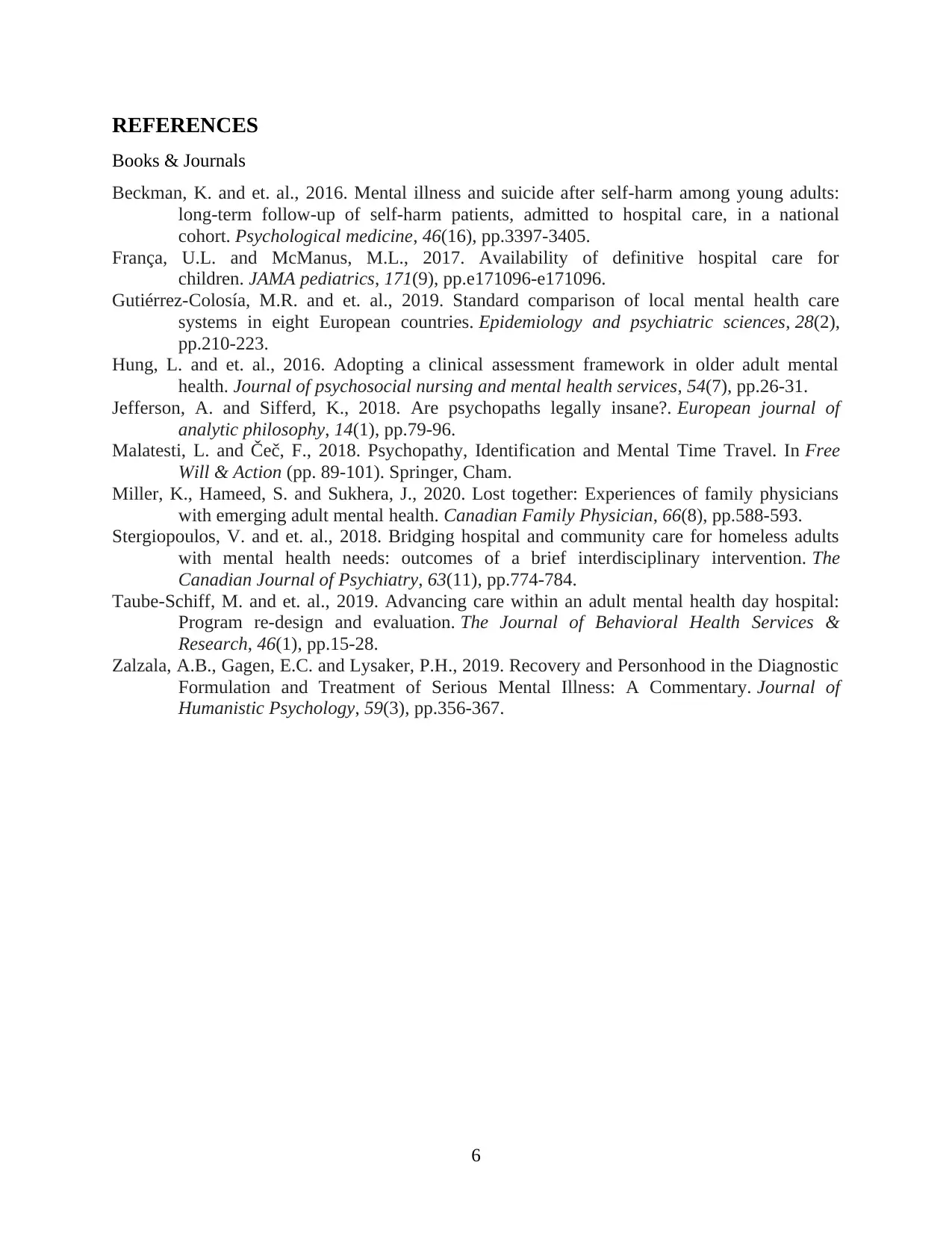
REFERENCES
Books & Journals
Beckman, K. and et. al., 2016. Mental illness and suicide after self-harm among young adults:
long-term follow-up of self-harm patients, admitted to hospital care, in a national
cohort. Psychological medicine, 46(16), pp.3397-3405.
França, U.L. and McManus, M.L., 2017. Availability of definitive hospital care for
children. JAMA pediatrics, 171(9), pp.e171096-e171096.
Gutiérrez-Colosía, M.R. and et. al., 2019. Standard comparison of local mental health care
systems in eight European countries. Epidemiology and psychiatric sciences, 28(2),
pp.210-223.
Hung, L. and et. al., 2016. Adopting a clinical assessment framework in older adult mental
health. Journal of psychosocial nursing and mental health services, 54(7), pp.26-31.
Jefferson, A. and Sifferd, K., 2018. Are psychopaths legally insane?. European journal of
analytic philosophy, 14(1), pp.79-96.
Malatesti, L. and Čeč, F., 2018. Psychopathy, Identification and Mental Time Travel. In Free
Will & Action (pp. 89-101). Springer, Cham.
Miller, K., Hameed, S. and Sukhera, J., 2020. Lost together: Experiences of family physicians
with emerging adult mental health. Canadian Family Physician, 66(8), pp.588-593.
Stergiopoulos, V. and et. al., 2018. Bridging hospital and community care for homeless adults
with mental health needs: outcomes of a brief interdisciplinary intervention. The
Canadian Journal of Psychiatry, 63(11), pp.774-784.
Taube-Schiff, M. and et. al., 2019. Advancing care within an adult mental health day hospital:
Program re-design and evaluation. The Journal of Behavioral Health Services &
Research, 46(1), pp.15-28.
Zalzala, A.B., Gagen, E.C. and Lysaker, P.H., 2019. Recovery and Personhood in the Diagnostic
Formulation and Treatment of Serious Mental Illness: A Commentary. Journal of
Humanistic Psychology, 59(3), pp.356-367.
6
Books & Journals
Beckman, K. and et. al., 2016. Mental illness and suicide after self-harm among young adults:
long-term follow-up of self-harm patients, admitted to hospital care, in a national
cohort. Psychological medicine, 46(16), pp.3397-3405.
França, U.L. and McManus, M.L., 2017. Availability of definitive hospital care for
children. JAMA pediatrics, 171(9), pp.e171096-e171096.
Gutiérrez-Colosía, M.R. and et. al., 2019. Standard comparison of local mental health care
systems in eight European countries. Epidemiology and psychiatric sciences, 28(2),
pp.210-223.
Hung, L. and et. al., 2016. Adopting a clinical assessment framework in older adult mental
health. Journal of psychosocial nursing and mental health services, 54(7), pp.26-31.
Jefferson, A. and Sifferd, K., 2018. Are psychopaths legally insane?. European journal of
analytic philosophy, 14(1), pp.79-96.
Malatesti, L. and Čeč, F., 2018. Psychopathy, Identification and Mental Time Travel. In Free
Will & Action (pp. 89-101). Springer, Cham.
Miller, K., Hameed, S. and Sukhera, J., 2020. Lost together: Experiences of family physicians
with emerging adult mental health. Canadian Family Physician, 66(8), pp.588-593.
Stergiopoulos, V. and et. al., 2018. Bridging hospital and community care for homeless adults
with mental health needs: outcomes of a brief interdisciplinary intervention. The
Canadian Journal of Psychiatry, 63(11), pp.774-784.
Taube-Schiff, M. and et. al., 2019. Advancing care within an adult mental health day hospital:
Program re-design and evaluation. The Journal of Behavioral Health Services &
Research, 46(1), pp.15-28.
Zalzala, A.B., Gagen, E.C. and Lysaker, P.H., 2019. Recovery and Personhood in the Diagnostic
Formulation and Treatment of Serious Mental Illness: A Commentary. Journal of
Humanistic Psychology, 59(3), pp.356-367.
6
⊘ This is a preview!⊘
Do you want full access?
Subscribe today to unlock all pages.

Trusted by 1+ million students worldwide
1 out of 6
Related Documents
Your All-in-One AI-Powered Toolkit for Academic Success.
+13062052269
info@desklib.com
Available 24*7 on WhatsApp / Email
![[object Object]](/_next/static/media/star-bottom.7253800d.svg)
Unlock your academic potential
Copyright © 2020–2026 A2Z Services. All Rights Reserved. Developed and managed by ZUCOL.





